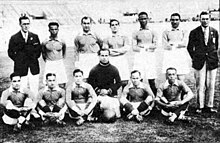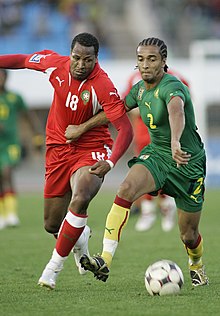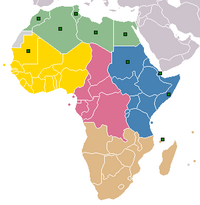Portal:Football in Africa
Introduction
Football is the most popular sport in Africa. Indeed, football is probably the most popular sport in every African country, although rugby and cricket are also very popular in South Africa. (Full article...)
This section may be unbalanced toward certain viewpoints. (October 2022) |

Selected article -
In the first tournament in 1957, there were only three participating nations: Egypt, Sudan, and Ethiopia. South Africa was originally scheduled to join, but was disqualified due to the apartheid policies of the government then in power. Since then, the tournament has expanded greatly, making it necessary to hold a qualifying tournament. The number of participants in the final tournament reached 16 in 1998 (16 teams were to compete in 1996, but Nigeria withdrew, reducing the field to 15, and the same happened with Togo's withdrawal in 2010), and until 2017, the format had been unchanged, with the 16 teams being drawn into four groups of four teams each, with the top two teams of each group advancing to a "knock-out" stage. On 20 July 2017, the Africa Cup of Nations was moved from January to June and expanded from 16 to 24 teams.
Egypt is the most successful nation in the cup's history, winning the tournament seven times, with Cameroon winning five times and Ghana four times. Three trophies have been awarded during the tournament's history; the current trophy was first awarded in 2002. Egypt won an unprecedented three consecutive titles in 2006, 2008, and 2010. In 2013, the tournament format was switched to being held in odd-numbered years so as not to interfere with the FIFA World Cup. Ivory Coast are the tournament's current champions, having beaten Nigeria 2–1 in the 2023 final.
Selected biography -
Ahmed Fathy Abdelmonem Ahmed Ibrahim (Arabic: أحمد فتحي; born 10 November 1984) is an Egyptian professional footballer who plays as a full-back for Pyramids.
He started his career with Egyptian side Ismaily SC before moving to England to play in the Premier League with Sheffield United in 2007. Fathy returned to Egypt after only a few months however, signing to Al Ahly where he has remained until April 2020 where he signed to Pyramids FC, whilst also spending some time on loan at both Kuwait side Kazma and Hull City back in England. Alongside his club career, Fathy has represented Egypt since 2002, playing over one hundred games and scoring nine goals for his country. Considered one of Africa's all time best right backs, winning the Africa cup of nations three times in a row - 2006,2008, and 2010
Selected image -
 |
Members of a 1960s Ghana national team pose with some of their trophies. The Ghana national team has won the Africa Cup of Nations four times, and is one of only three African teams to have ever reached the quarter-finals of a FIFA World Cup finals.
Subcategories
Related portals
More sports portals
WikiProjects
Related task forces and sub-projects
African football task force
WikiProject Africa • WikiProject Football
WikiProject Football task forces and sub-projects
 | |
| Wikipedia ads | file info – #250 |
Topics
Open tasks

- Expand stubs: Competitions in Africa • Organizations
- Expand club articles of teams from Africa.
- Expand biographies of Africans involved in football.
- Create: Requested articles • Most wanted football articles • Requested general football articles
- Add: Infoboxes • Images (General requests, Requested images of people)
- Review: articles currently under review
- Assess: Assessment requests • Assess an article
- Revert vandalism on this portal and on African football articles
- Assist in maintaining this portal and keeping its selected content up to date.
- WikiNews: Create and submit news stories about African football for Wikipedia's sister project WikiNews.
Associated Wikimedia
The following Wikimedia Foundation sister projects provide more on this subject:
-
Commons
Free media repository -
Wikibooks
Free textbooks and manuals -
Wikidata
Free knowledge base -
Wikinews
Free-content news -
Wikiquote
Collection of quotations -
Wikisource
Free-content library -
Wikiversity
Free learning tools -
Wiktionary
Dictionary and thesaurus
More portals
Sources

- ^ "The History Of Soccer In Africa". NPR.org. 2010-06-09. Retrieved 2016-03-31.
- ^ a b c Alegi, Peter (2010). African Soccerscapes. Ohio University Press. pp. 1–2. ISBN 9780896802780.
- ^ Frimpong, Enoch Darfah. "Ghana news: A world of superstition, frustration and disillusionment - Graphic Online". Retrieved 23 September 2017.
- ^ Lacey, Marc (8 August 2002). "Kangemi Journal; For Spellbinding Soccer, the Juju Man's on the Ball". The New York Times. NY Times. Retrieved 2016-03-31.
- ^ "World Cup Witchcraft: Africa Teams Turn to Magic for Aid". National Geographic. Archived from the original on July 10, 2006. Retrieved 2016-03-31.
- ^ Andy Mitten (September 2010). The Rough Guide to Cult Football. Rough Guides UK. ISBN 9781405387965. Retrieved 2016-04-02.
- ^ "African Nations Cup overshadowed by hocus pocus | Football". The Guardian. Retrieved 2016-04-09.
- ^ Kuper, Simon (2006). Soccer Against the Enemy: How the World's Most Popular Sport Starts and Stops Wars, Fuels Revolutions, and Keeps Dictators in Power. Nation Books. p. 123. ISBN 978-1-56025-878-0.


























